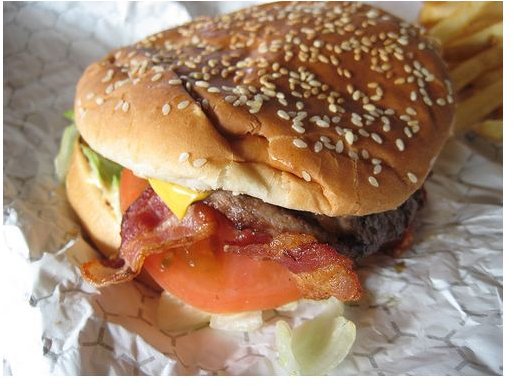Nutrigenomics: Food and Gene Expression. Does The Food You Eat Interfere with Messenger RNA?
Food And Genes: Can Your Diet Affect Gene Expression?
When you wander round your local supermarket loading up your trolley, do you ever think about the effects the food you’re buying might have in your body? Regular government initiatives encourage us to eat our ‘five a day’ (or more), cut down salt, lose weight etc. But what are the mechanisms, should they exist, via which food might wreak havoc – or create beneficial effects – on our bodies?
Some scientists have examined the question of whether diet can affect what genes are transcribed and translated within your cells. That is to say, which bits of your genetic heritage are actually read – like reading a set of instructions for an IKEA bookcase – and acted upon, producing a tangible result, rather than being left on the shelf like an uninteresting book.
Could This Tasty Burger Switch Gene Transcription On Or Off?
Gene Transcription and Macronutrient Intervention: Is There A Connection?
One study (using rats as test subjects) has found that polyunsaturated fatty acids (PUFAs) can reduce mRNA (messenger RNA) levels from lipogenic enzyme genes within hepatocytes (liver cells). Lipogenic enzymes are involved with fat synthesis. The fact that the levels of mRNA are reduced suggests that the process is affected at a pre-translational stage. This means at the point where the gene is read, rather than after the enzymes themselves have been produced. mRNA is an intermediate ‘product’ in the gene expression process and needs to be ’translated’ into the final gene product.
Many studies have been carried out in recent years in the area of caloric restriction (CR) and dietary restriction. These studies look at the anti-ageing effects of a reduced-calorie diet or alternatively a diet with tweaked levels of macronutrients. One study has looked at the effect on fruit flies of restricting carbohydrate intake (i.e. sugar), versus restricting yeast intake (i.e. protein and lipid). Restriction of lipid and protein intake was found to have a considerably greater effect on longevity, suggesting that any beneficial effects from caloric restriction may not be simply due to a reduction in calories. CR has interestingly been found to regulate production of biomolecules capable of interacting with transcription factors.
Caloric Restriction and Reactive Oxygen Species: Is There A Link to Lifespan Enhancement?
One study on food restriction (FR) found that it reduced oxidative damage in elderly mice. The researchers also found that ageing mice normally produced increased anti-oxidant enzyme activity, and that FR reduced this expected increase. The results suggest that enzymes are not the route that caloric restriction damps down the oxidative damage of the ageing process.
What is does suggest is that caloric restriction may ramp up or damp down gene expression (e.g. of anti-oxidant enzymes): what other genes may be affected? And are fewer anti-oxidant enzymes needed simply because fewer reactive oxygen species (ROS) are produced in an organism subjected to caloric restriction? ROS are small molecules that can cause damage to cells. Previous researchers have noted that reactive oxygen species can up or down-regulate gene expression via interaction with transcription factors.
Nutrigenomics And Gene Expression: What Might It Do For Us?
The intersection of diet and gene expression is now regarded as a specific discipline i.e. nutrigenomics. As well as total calorie manipulation and macronutrient level manipulation, studies may also look at the interaction of specific dietary substances and nutrients with genetic material and how gene expression may be affected. An example of this is where scientists look at the inflammatory process shared by a number of different diseases, to see how dietary factors may interfere with this process at the genetic level. The idea is that this knowledge can be used to design ways of optimising nutrition to a person’s genotype, thereby helping an individual avoid some diseases or at the very least being able to treat and cure disorders.
It seems there is sufficient evidence to suggest that at the transcriptional level, the food choices you make could affect which of your genes get to be ’taken off the shelf’ and read, more than we might ever have thought possible.
Reference
D B Jump, S D Clarke, O MacDougald, and A Thelen. Polyunsaturated fatty acids inhibit S14 gene transcription in rat liver and cultured hepatocytes. Proceedings of the National Academy of Sciences. September 15, 1993 vol. 90 no. 18 8454-8458
